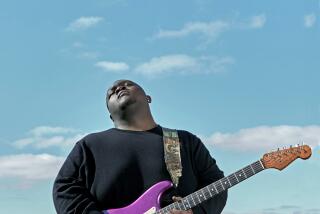He’s Not the Bernard King of Old, but Then, He Doesn’t Have to Be
- Share via
On occasion, Bernard King gets in these zones where he’s very nearly impossible to stop, and the temptation to measure him by the old standard is fairly irresistible. But it’s unfair. And King knows it’s unfair. Which is how he stays not only sane, but also actually happy.
He’s happy being who he is -- a healthy, productive member of NBA society.
“I don’t compare performances,” he says. “I don’t compare myself from year to year. I just try to do as well as I can each time I play.”
That’s a pretty standard quote (you can look it up in the athlete’s handbook under “Ways to Deflect the Idly Curious”), and anyone might have said it. But for King, it’s more or less an ethos.
He doesn’t compare. He can’t afford to.
For once upon a time, King did set the standard for scoring forwards, scoring alternately in great bursts and in great bunches, slashing to the basket, burying the jumper and averaging as many as 33 points a game.
You remember the back-to-back, 50-point games? George Gervin could score like that. And David Thompson. Now, of course, Michael Jordan can. These are the people, the on-court havoc makers, King could run with, until the tear in his right knee, on a March night in 1985, ground him to a stop.
It wasn’t just any torn knee. It was the kind that tears at your heart, too, and might well ruin a career in the process.
For King, there were two years of enforced absence from the game, two years of long days and nights spent in rehabilitation, two years of doubts that he could ever make it all the way back.
And so, he doesn’t compare.
Why should he? He’s a good to very good player. He makes $1 million a year. At age 32, he is the star of the lowly Washington Bullets and, if he no longer sets a standard, he is in the upper half of small forwards in the league.
And that’s plenty. It’s more than plenty.
Happy? You bet. He can live with the losing, though he’d prefer it to be otherwise. He says, as long as the effort is there, that’s all he can ask. He can live with the slow torture of NBA life, and in fact plans to live with it as long as he can. It was not for nothing that he spent those two years.
Sitting in the Bullets’ dressing room after a recent game, an ice pack strapped to each knee, King discussed his game (a 36-point effort) and his future. When someone asked the inevitable question (“How’s the knee?”), he provided the usual answer (“Fine”) and went on from there.
“There’s no problem with the knee any more,” he said. “But I’m not going to tell you I can cut as quickly as I used to, or if I can’t. I don’t think about those things. I feel good, and I play.”
Not only that, he plays hard. It’s a defining facet of his game, this determination to perform. He can be a hard person at times, and it’s that hardness, one supposes, that gave him the strength to overcome an injury that should have been the end of Bernard King, basketball player.
We shouldn’t underestimate what he has done. Already 28 years old when the knee gave way, King could merely have accepted that bad luck is a part of the game of life. After all, he had options. Bright and attractive, he has acted in movies and on television and has even helped underwrite a play.
There will be life after basketball for King. But he’s in no rush to get there, basketball being what he does best.
And yet, you can give away very little in the NBA when you’re a 6-foot-7 small forward who must rely on quick feet to get your shot. At 32, King should be slowing down anyway, if only because knees are not meant to withstand the punishment of years spent pounding the hardwood. But he’s not slowing down. No, he has these nights that, if you close your eyes, you can picture him back in the Garden playing the game as few people ever have. In this season, he’s had back-to-back, 37-point nights.
Soon, this season will be over, and King could be an unrestricted free agent, meaning he could sign with anyone, and the Bullets would not have the option to match the offer. Meaning, the Bullets should move quickly.
On a team that has little enough to offer, the Bullets need King, if only as an example to their younger players of what intensity really means. They also need points, and King can still provide them.
If there’s the problem of glut at King’s position (John Williams plays there, too), it’s probably the least of the Bullets’ many concerns. But does King still want the Bullets? He dodges the question of his future with a feint and a smile.
“I don’t think about it,” he says, not really expecting you to believe it.
“I know I’m going to be playing, somewhere,” he says. “So, I don’t really have to think about it.”
He is reassured by the certainly that someone will want him and that he made it happen himself. By whatever measure you employ, he knows he can still play. A couple of years ago, King’s future was the great unknown, and, if you want to compare moments, that’s where the comparison is valid. Not so long ago, King didn’t have a career; now, against all reason, he does.
More to Read
All things Lakers, all the time.
Get all the Lakers news you need in Dan Woike's weekly newsletter.
You may occasionally receive promotional content from the Los Angeles Times.






